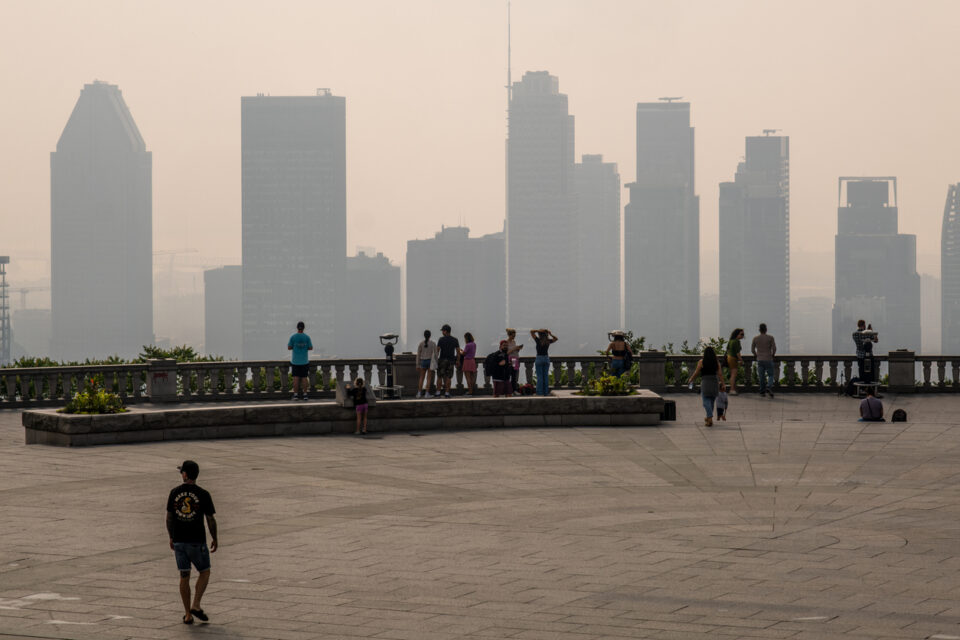Data Scientist Reveals Climate Crisis' Hidden Toll on Sleep and Learning
April 24, 2024

Although the World Health Organization declared climate change a major threat to human health, research is only beginning to identify the full spectrum of ways global warming-related incidents impact humanity.
Kelton Minor, PhD, a postdoctoral research scientist at the Data Science Institute, is pioneering some of this important work, drawing on computational, behavioral, and environmental data science to study how humans adapt to planetary changes and climate hazards.

Minor has recently published a review in Nature Climate Change that uncovers the impacts of climate-related stressors on educational attainment, a new globally representative assessment of how humankind spends its time on Earth in PNAS, and a study in Sleep Medicine Reviews on how heat affects sleep around the world. Minor is a member of the Lancet Countdown on Health and Climate Change’s Working Group 1, a role in which he is developing global indicators for monitoring climate change-related alterations in extreme precipitation, sleep loss, and mental health.
As a researcher, I’m deeply interested in the complex ways that the climate – as well as changes in local weather made more common by global climate change – impact humanity.
How does the environment that we live in and the weather that surrounds us impact our life, our health-related behaviors, and really our ability to flourish?
My two most recent publications focus on the impact of climate change on sleep and educational outcomes across the human lifespan.I’ve also previously studied the rise of social media use during extreme weather events, a study which strongly suggested that extreme rainfall and heat adversely affect mood.
My colleagues and I conducted the first global scale literature review of the different pathways through which climate-related weather events impact children’s education and attainment.
We found that various stressors worsened by climate change (like extreme heat, wildfire smoke, and so on) persistently impact children’s ability to learn, their school attendance, overall academic performance, and later, their income.
Heat is a particularly important stressor. We found that extreme heat itself is not just associated with lowered learning, but several rigorous studies identified by our review imply a causal relationship. Our review suggests that exposure to heat appears to degrade childrens’ potential in ways that cascade across the life course.
Another example is wildfires, which have direct and indirect educational impacts which can occur both locally and in locations far away from the fire source.
Other effects – from economic stress to increases in diseases driven by changing climates – can also be profound.
The adverse effects most heavily impact children in socioeconomically disadvantaged regions that often lack resources like cooling infrastructure, contributing to vulnerabilities that exacerbate climate risks.
These educational disruptions hold long-term consequences. We found that they can significantly influence lifelong earning potentials and societal contributions, perpetuating cycles of poverty and inequality.
This emphasizes the need for strategic planning to mitigate these impacts and foster resilient educational frameworks and infrastructure.
In our recently published study, we found a compelling link between rising night-time ambient temperatures due to climate change and disruptions in sleep patterns globally.
This effect is more pronounced during hotter months and in warmer regions, but what’s particularly troubling is its stronger impact on vulnerable populations like the elderly and those in lower-income countries.
The implications are profound and wide-reaching. Poor sleep is not merely a matter of feeling tired; it is linked to serious health risks, including cardiovascular and metabolic diseases.
From a policy perspective, these findings demonstrate the need for integrated public health strategies that consider equitable access to cooler, greener spaces, cooling technologies in buildings, and sustainable energy systems that do not contribute to additional warming and heat-related sleep loss.
The climate hazards that people are exposed to are increasing in severity and frequency. We need more research, especially more harmonized research bringing together international teams.
When it comes to sleep, our review on heat and sleep highlighted not just the impact of climate related events on sleep, but the unequal distribution of research geographically.
We were unable to locate relevant sleep studies for some of the regions that are already exposed to some of the highest temperatures globally. You could say that research is also a resource that is unevenly distributed.
We also need to better understand how heat impacts sleep in people with prior sleep disorders, houseless populations, and incarcerated settings where air conditioning access and provision is scarce.
In the realm of education, our Nature Climate Change article calls for standardized global scale monitoring of the educational impacts of climate and climate change-related stressors. We need to examine the interactions and the accumulation of these stressors in populations over time.
We also need to think about the impacts of climate change on education outcomes in the long term, using what we refer to in our paper as a “developmental climate risk perspective.”
Since education promotes knowledge about climate change, which contributes to climate action and adaptive capacity, these educational impacts may contribute to a dangerous cycle of amplified climate hazards and children’s vulnerability.